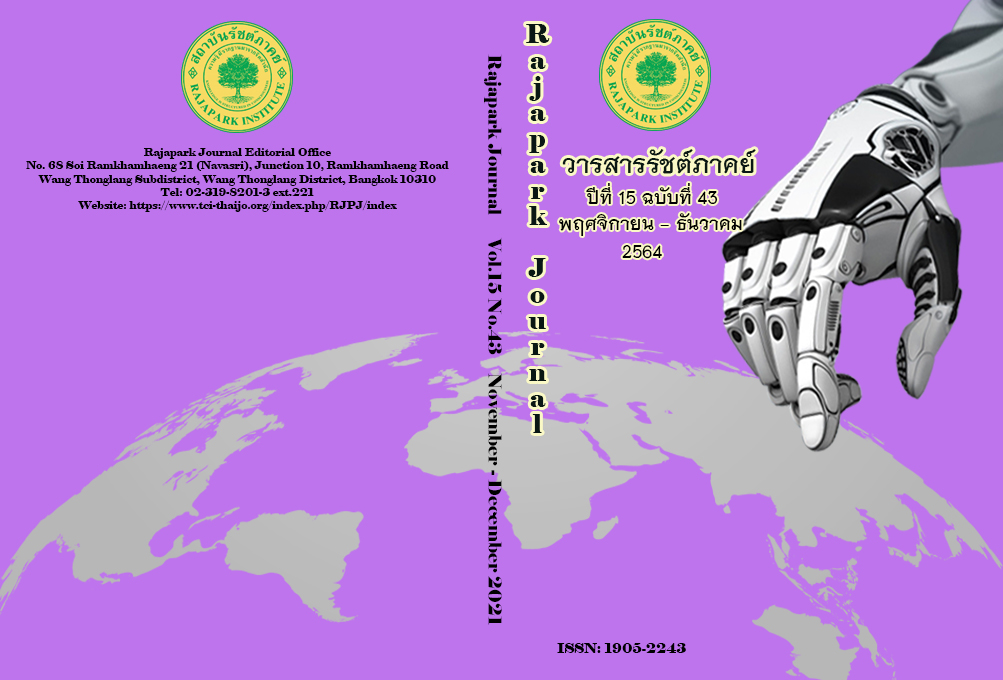Effects of an Instruction Using the Five Aggregates Teaching Method Towards The Health Behaviors on The Topic of Family Planning and Reproductive System Disease for The Undergraduate Students in Srinakharinwirot University
Main Article Content
Abstract
The purposes of this research were to study the effectiveness of the learning activity plans and the effects of the instruction using the five aggregates teaching method towards the health behaviors on the topic of family planning and reproductive system disease, compare the health behaviors teaching between the five aggregates teaching method and the conventional teaching method; and to study the students’ satisfaction concerning the five aggregates teaching method. The sample group was the undergraduate students enrolling in the sex education course at Srinakharinwirot University, during the second semester of academic year 2020. The sample group was divided into 30 experimental groups of students and the control group of 29 students. The research instruments were composed of learning activity plans using the five aggregates teaching method. The health behavior test and the questionnaire concerning the students’ satisfaction with the instruction using five aggregates teaching method. The obtained data were then analyzed in terms of means, standard deviation and t-test. The research findings were as follows, the effectiveness of the five aggregates teaching method in learning activity plans was higher than the standard criterion set at 80/80, and the experimental group had significantly improved in their health behaviors than before learning in the five aggregates teaching method at the .05 level, the experimental group had significantly improved in the health behaviors was scored higher than the control group after learning at the .05 level, the students’ satisfaction concerning the instruction using the five aggregates teaching method was found at the highest level.
Article Details
Views and opinions appearing in the Journal it is the responsibility of the author of the article, and does not constitute the view and responsibility of the editorial team.
References
Areekul, W. (2010). Adolescent Health Care and Supervision. Bangkok: Rungsilp Printing.
Boonnarakorn, S. (2011). Holistic Health Promotion for All Ages. Songkhla: Tame Printing.
Diloksambandh, C. (2000). Sex Education. Bangkok: Sophon Printing.
Erbsuksiri, A. (2016). Psychology for Teachers. Bangkok: Chulalongkorn University Publishing.
Kaewwanarat, A. (2012). Methods of Health Education. Chiang Mai: Unity and Progress Solution.
Khammani, T. (2017). Pedagogical Science: Knowledge for Effective Organization of Learning Processes. Bangkok: Chulalongkorn University Publishing.
Komut, P. (1989). Methods for Teaching Ethical Education in The Five Aggregates Teaching. Civil Service Journal, 30(2), 41-45.
Mangkhang, C. (2018). Knowledge of Curriculum and Teaching in Social Studies. Bangkok: Chulalongkorn University.
Ministry of Education. (2002). National Education Act B.E. 2542(1999). Bangkok: Organization for the Delivery of Good and Materials.
Munkham, S., & Munkham, O. (2010). 20 Learning Methods: To Develop Morals, Ethics, Values and Learning by Seeking Knowledge for Oneself. Bangkok: Parbpim Printing.
Niyomsap, N. (2017). Basic Knowledge on Instruction. Nakon pathom: Silapakorn University.
Powwattana, A. et al. (2017). Risk Behavior Prevention in Adolescence: Concepts and Management in Multilevel Approach. Bangkok: Danex Intercorporation.
Pramaha Yothin Yodhiko. (2018). The Managements of Five Aggregates for Problem Solution and Human Development in Buddhism(Doctor of Philosophy). Mahachulalongkornrajavidyalaya University.
Rojpaisarnkit, K. et al. (2017). Project of Eastern Region Higher Education Institute Network for Knowingly the Alcohol Problems. Chachoengsao: MN Computeroffset.
Sangkarom, P. (2013). Development of Learning Activities in Buddhism Course Based on the Mixture of Benjakhan(Five Attributes of Life or Five Groups of Existence) and Graphic Organizer in the Learning Unit of Buddhist Dhamma for Mathayom Suksa 4(Master of Education). Sakon Nakhon Rajabhat University.
Sarayuthpitak, J. (2014). School Health Program. Bangkok: Chulalongkorn University.
Seangpraw, K. (2018). Health Education and Health Behavior. Bangkok: Chulalongkorn University.
Sinlarat, P. (2014). Principles and Techniques of Teaching in Higher Education. Bangkok: Chulalongkorn University.
Soda, N. (2012). The Study of Learning Outcome Using Five Elements in The Learning Area of Social Studies Religion and Culture Unit of Dhamma for Mathayomsuksa 1 Nongnakhamwittayakom School Khon Kaen Province(Master of Education). Khon Kaen: Khon Kaen University.
Somprayoon, S., & Somprayoon, W. (1998). Sex Education. Bangkok: Thai Watana Panich.
Sota, C. (2011). Concept Theory and Application for Health Behavior Development. Khon Kaen: Khon Kaen University.
Suaysasrd, S. (2012). Sex Education. Bangkok: Chulalongkorn University Publishing.
Suboonmee, S. (2003). The Effects of Benjakhantha Teaching Method on Learning Achievement and Problem Solving Thinking Skills in Yonisomanasikarn on the Topic of Buddhist Dhamma in the Social Studies, Religion, and Culture Learning Area of Mathayom Suksa II Students in Basic Education Expansion Schools in Khumueang District of Buriram Province(Master of Education). Sukhothai Thammathirat Open University.
Tangkittipaporn, J. (2014). General Psychology. Bangkok: Chulalongkorn University Publishing.
Tumthong, B. (2016). Theories and Development of Instructional Model. Bangkok: Triple Education.
Upaphai, N. (2015). Psychology Education. Bangkok: Chulalongkorn University Publishing.
Utoomporn, N. (2015). Tools and Techniques for Collecting Data for Research. Bangkok: House of Kermyst.
Wattanaburanon, A. (2016). A Manual of Love MODEL Application: Model for Enhancing Comprehensive Humanization. Bangkok: Odeon store.


